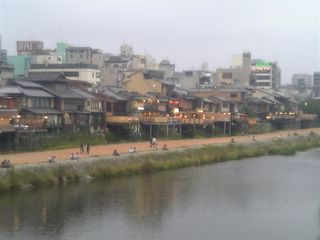I haven't written much lately because I've been depressed, flat out and strung. On Monday Kiyono downgraded us to friends, a nothing word considering we were not friends to start with. It's got to me more than I thought it would, made me realise how fragile, precarious the gaijin life is, balanced on the outskirts of society, looking in.
I have no intention of staying for a lifetime; I love Japan for its bursting life, vibrancy, the differences, the buzz and hum of the cities; I love Japan at night when the bleak concrete facade of Osaka is cloaked in neon, when people come out to play, to drink and stagger home, to flirt in alleyways beneath garish backlit kanji, when men bolster their egos with women like Kiyono, when everyone inverts themselves, a neat flip from obsessive perfectionists to the decadensia. But I do not want to live in a place where I do not know the rules and where I will never be accepted as an equal. This is the pain of every migrant; to know that your children will be natives, will begin to merge with the culture as you can never do, set in your ways, negotiating the culture via pantomimes, fixed smiles, stilted conversation. Every single foreign longtermer in Japan I have met - perhaps 30 people all up - endures by connecting with other longtermers, making a small ghetto, a place of safety on the margins.
But my main entry point to society, my fixed point, my warmth here, she has ceased, with a smile, she gave me a smile of farewell, warm, polite, but through glass. She was never my girlfriend, she was someone I needed and who was kind to me, who taught me to walk here, taught me to speak, almost motherlike in that sense, but she must have become increasingly uncomfortable with my need, my need to have contact, to build up a protective routine, an adaptation. Gaijin are largely male; and if they plan to stay, they quickly obtain girlfriends and then sleep with other girls on the side. But the primary girlfriend/caregiver, the homebase, she is crucial. For my part, I was faithful, but to an idea of her which was more than she wanted. I always wondered whether I should try harder to fall in love and now it is too late, or perhaps exactly the right time. She didn't show to my birthday party, offered a reasonable excuse and forgot about it, we argued via text message and she mentioned friends, confusion, coolness; Monday we met, it was her birthday the day before, I gave her something I wrote, a little snap of her in words, more flattering than reality, a farewell. The ex-boyfriend is back, in body and mind and my place, as the valley between two patches of rocks in their relationship, is over. The guy sounds like an clot but it's easy to love assholes, for the struggle, for the pain, for the thrill of the well-worn rollercoaster between love and hate. She was wearing a yukata, a light kimono, she was beautiful; I, in daggy shorts, a tshirt, sandals, and we were able to talk, laugh, drink to get drunk, bid each other farewell, and she talked of visiting Australia, which she won't, and we talked of going to Okinawa together as friends, which we won't, and she let me kiss her a last time as if there was still more to come.
I was feeling good this morning, liberated, dreaming of the future on the train. The children at the kindergarten had missed me (I was away for a week) and leapt into my arms. Then the afternoon lull, the pause in the breath of the day, and I mourned my lover and grew angry and sad and a song formed in my mind and I sang it to the children who stopped what they were doing and watched me as I cried.
Maybe I'll change my mind again, maybe I'll find someone else quick smart, take advantage of my exoticism once more, but I don't think so. I think I will come home, perhaps in two months, where living is easy, where I can understand nuances, where I can speak, where the easy familiarities, easy irritations, the ease will take me up into it. The global village is a myth, a vast overstatement. Culture and language and religion are far bigger dividers than the idealists believe; the tens of wars post-WWII - the war after which there could supposedly be no war - show it up as a desperate hope. I am an alien here, and I feel it keenly. No wonder the long termers all wear matching hangdog expressions; first generation migrants trying to break in to a society which has passively resisted outsiders for millenia, absorbing and improving good foreign ideas - kanji (China), the Industrial Revolution (Germany), postwar capitalism (America) - but not foreign people.
This evening, another train, the sun slowly extinguishing itself in the sea.










